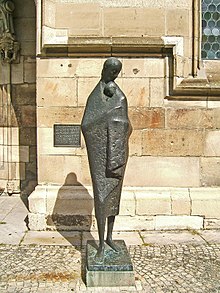Psalm 131

The short Psalm 131 is after the counting of the Septuagint and the Vulgate Psalm 130. In medieval Latin tradition it is also named after its initial words: Domine, non est exaltatum cor meum . He belongs to the group of pilgrimage psalms (Psalm 120 to Psalm 134).
content
Masoretic text
In recent research, Psalm 131 is often regarded as a woman's text, that is, as a wisdom-meditative text in the mouth of a woman praying. After contrasting two life plans “pride” (verse 1) and “rest in YHWH” (verse 2), the prayer decided on the second option and in verse 3 also wishes Israel as a whole such rest in God.
A woman's prayer?
This interpretation results from a very literal translation of the masoretic text of verse 2b: כגמל עלי אמו כגמל עלי נפשי׃ " Like a little child on / with its mother , like the little child on / with me - such is my soul (add: with you, YHWH ). "
Some exegetes see in this verse the realistic representation of a woman walking to Jerusalem with her child on her back (or on her shoulders): the verse "is the self-portrait of the psalmist on the pilgrimage."
Different interpretations of the child (גמל) in 2b
- Uniform translation 1980 Like a small child with its mother, my soul is still in me .
- Zurich Bible Like a weaned child with its mother, like a weaned child, my soul is calm within me .
- Uniform translation 2016 Like a breastfed child with its mother, like a breastfed child, so is my soul in me .
- Luther Bible 2017 Like a small child with its mother, like a small child, so is my soul in me .
Mostly one understands by גמל a weaned child; To understand this picture, however, it must be remembered that breastfeeding took place for a long time: “ Our rabbis taught: A child must be breastfed for 24 months. ... Rabbi Joshua said: Even four or five years. “According to 2 Maccabees 7:27 , children in Hellenistic times were breastfed for three years.
Septuagint and Vulgate
The Septuagint takes verse 2 a different meaning: μὴ ἐταπεινοφρόνουν ἀλλὰ ὕψωσα τὴν Εἰ ψυχήν μου ὡς τὸ ἀπογεγαλακτισμένον ἐπὶ τὴν μητέρα αὐτοῦ ὡς ἀνταπόδοσις ἐπὶ τὴν ψυχήν μου. “ If I didn't think little, but lift up my soul, (then I would be) like the weaned child against its mother, (then your punishment would be) like retribution against my soul. "
The Vulgate also understands the text: Si non humiliter sentiebam, sed exaltavi animam meam; sicut ablactatus est super matre sua, ita retributio in anima mea .
reception
Liturgy of the Hours
According to the Benedictine Antiphonals , Psalm 131 is prayed in the noon shore on Thursday, and also at noon in the Commune Office for holy women.
music
- Heinrich Schütz : Domine, non est exaltatum cor meum. SWV 78-80
literature
- Erich Zenger / Frank-Lothar Hossfeld : Psalms 101–150 (Herder's Theological Commentary on the Old Testament). Freiburg - Basel - Vienna 2008, pp. 595–610.
- Klaus Seybold : The Psalms (Handbook for the Old Testament) JCB Mohr (Paul Siebeck), Tübingen 1996
Web links
- Psalm 131 in the standard translation , the Luther Bible and other translations from bibleserver.com
- Psalm 131 in the Biblia Hebraica Stuttgartensia (BHS) on bibelwissenschaft.de
- Sheet music in the public domain of settings for Psalm 131 in the Choral Public Domain Library - ChoralWiki (English)
Individual evidence
- ↑ Erich Zenger: Stuttgart Psalter . S. 357 .
- ↑ Klaus Seybold: The Psalms . S. 495 .
- ↑ Talmud Ketubot. P. 60 a , accessed on December 30, 2017 (English).
- ↑ Wolfgang Kraus, Martin Karrer (Ed.): Septuagint German: The Greek Old Testament in German translation . Stuttgart 2009, p. 884 .
- ↑ Münsterschwarzach Abbey (ed.): Benedictine Antiphonale . 3. Edition. tape 2 . Münsterschwarzach 2007, p. 111-112 .
- ↑ Benedictine Antiphonals . tape 2 , p. 165 .
